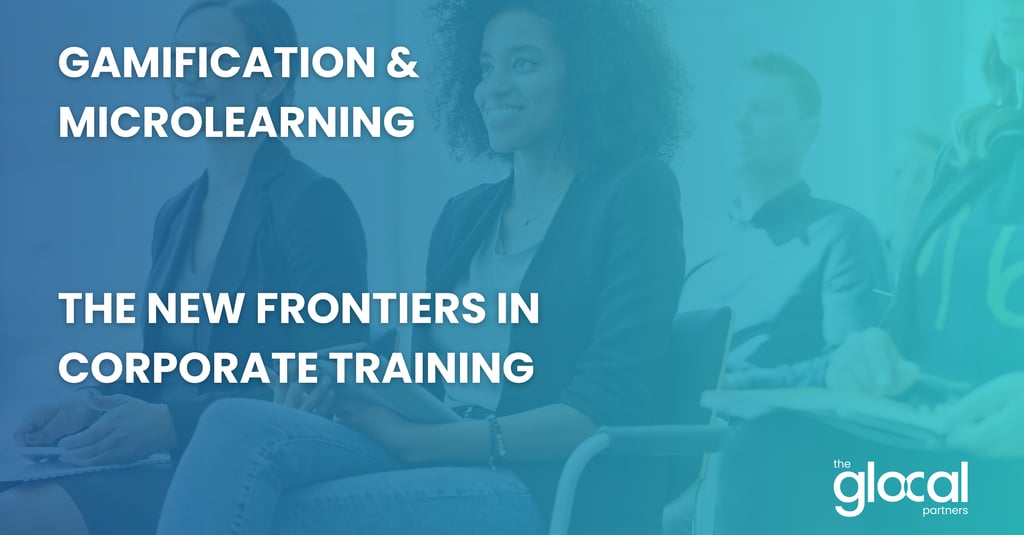Gamification & Microlearning
The New Frontiers in Corporate Training
The Glocal Partners
9/16/20252 min read


The integration of game mechanics and bite-sized learning modules has emerged as a powerful approach to address engagement challenges and diminishing attention spans in corporate learning environments, fundamentally changing how organizations deliver and reinforce critical knowledge and skills.
Key Challenges in Traditional Learning Approaches:
Engagement and Completion Issues -- According to LinkedIn's Workplace Learning Report (2023), traditional corporate training experiences average only 15% voluntary participation and 42% completion rates, with motivation rather than capability being the primary barrier.
Information Retention Limitations -- The Harvard Institute for Learning & Memory Research (2022) found that employees forget approximately 70% of traditional training content within six days without specific reinforcement mechanisms, rendering most single-event training largely ineffective.
Knowledge Application Gaps -- Bersin & Associates' Learning Transfer Study (2023) reveals that just 12% of learners consistently apply skills from traditional training programs to their work environment, creating significant wasted investment in unused capabilities.
Schedule Flexibility Constraints -- The Association for Talent Development's Learner Accessibility Survey (2022) indicates that 57% of employees regularly postpone or abandon learning activities that require time blocks longer than 15 minutes, citing workload pressures and interruptions.
Strategic Solutions through Modern Learning Approaches:
Implement comprehensive gamification frameworks incorporating narrative structures, achievement systems, competitive/collaborative dynamics, and reward mechanisms aligned with learning objectives, as recommended by the eLearning Guild's Motivational Learning Architecture.
Develop structured microlearning ecosystems that decompose complex topics into 5-10 minute self-contained modules optimized for specific learning outcomes and accessible across devices, following the Learning Strategy Institute's Component Learning Methodology.
Create spaced learning reinforcement systems leveraging notifications, retrieval practice, application challenges, and knowledge tests distributed over time to combat forgetting curves, using the Cognitive Science Association's Retention Optimization Model.
Establish integrated learning analytics platforms measuring engagement patterns, knowledge retention, skill application, and performance impact to continuously refine learning experiences, utilizing Josh Bersin's Learning Effectiveness Framework.
Key Takeaway:
According to PwC's Next-Generation Learning Impact Study (2023), organizations effectively deploying gamification and microlearning achieve 89% higher voluntary participation, 76% greater knowledge retention at 90 days, and 43% stronger application rates compared to those using traditional approaches alone. Most significantly, these modern learning methods deliver 52% faster time-to-proficiency while reducing total training time requirements by 38%, creating substantial competitive advantages in both workforce capability and operational efficiency during periods of significant change.
LinkedIn. (2023). Workplace Learning Report. https://learning.linkedin.com/resources/workplace-learning-report-2023
Harvard Institute for Learning & Memory Research. (2022). Corporate Training Retention Study. https://learningandmemory.harvard.edu/corporate-training-retention-study-2022
Bersin & Associates. (2023). Learning Transfer Study. https://www.bersin.com/research/learning-transfer-study-2023
Association for Talent Development. (2022). Learner Accessibility Survey. https://www.td.org/research/learner-accessibility-survey-2022
PwC. (2023). Next-Generation Learning Impact Study. https://www.pwc.com/us/en/services/consulting/workforce/next-generation-learning-impact-study-2023
theglocals@theglocalpartners.com
© 2026. All rights reserved.
This website is Powered by: The Glocal Partners LLC
